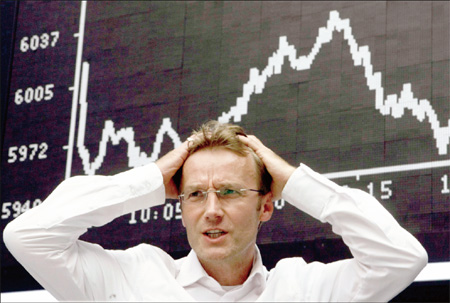A comparative study of two financial crises
- By Liu He
 0 Comment(s)
0 Comment(s) Print
Print E-mail China.org.cn, October 17, 2013
E-mail China.org.cn, October 17, 2013
China's central authorities, more specifically the Leading Group for Financial and Economic Affairs, initiated a research project in 2010 called "A Comparative Study of Two World Financial Crises," an extensive study carried out by a handful of renowned financial and academic institutes, including the People's Bank of China (PBC), China Development Bank, the China Banking Regulatory Commission (CBRC), the Chinese Academy of Social Sciences (CASS) and Peking University.
The some three-year-long project has benefitted the central authorities in their policymaking. The following is a summary.
Similarities between the two crises

Through comparative studies and based on political economics, we have found ten similarities between the two financial crises, concluded as follows.
1. Both crises occurred in the wake of a major technological revolution. The cautionary significance is that, in case of a future major technological revolution, we shall both fully understand its significance and its implication for substantial impact on society.
2. Prior to both crises, there had been unprecedented economic prosperity, owing to extremely liberal economic policies implemented in countries which later became the origins of crises. During both crises, enterprising businessmen made the most of loosened government control and drove forward the economy, but also triggered the crisis.
3. The excessively polarized income distribution was an omen. Both crises happened when most of the social wealth was in possession of a small fraction of people. This crisis featured the separation between the nominal ownership of production materials and the actual right to use it; the virtual economy and a minority of elites were in control.
4. Populist policies exacerbated the crises, and developed countries failed in their public policies.
Technological innovation and a widening wealth gap caused too much psychological pressure, before arousing a collective sentiment in society. Unable to change this, and in the bid for more votes, governments introduced populist policies in a bid to appease the dissatisfied public.
Populist commitments reduce people's enterprising spirit, making them more dependent on their government. But once the public realizes the government is unable to provide what it has committed, the collective social ethos will drastically weaken, gradually producing contempt for authority, refusal to change and hatred of the successful.
Meanwhile, governments have started to get used to excessive financial liabilities in their desire for welfare. The current Euro crisis is a good example.
5. Ordinary people were extremely prone to speculate; they repeatedly tried to convince themselves that they could get rich overnight, as the polarization of wealth pushed people to improve their social status, sometimes by means of speculation miracles. In such times, greed, forgetfulness and other hidden desires in human nature surfaced.
6. Both crises were linked with loosened monetary policies, because governments wished to see better growth. Before the Great Depression, lax credit policies caused stock market bubbles and people's obsession with speculation. Similarly, before this crisis, the U.S. Federal Reserve implemented an extraordinary loose monetary policy. As a result, mounting subprime loans led to economic bubbles.
7. Policymakers always face the ideological shackles of populism, nationalism and politicized economic issues. The market kept challenging unconvincing government policies, and made the situation worse.
Faced with a severe crisis, many countries repeated their mistakes in policymaking, especially in missing the right time for action. They took on austerity policies when expansionary ones would have been better, and turned to protectionism when they should have increased international cooperation.
Such obvious errors seem ridiculous with hindsight, but were indeed difficult to spot at the time, largely because most people only encounter such a crisis once in a lifetime. Inexperienced and shackled by ideological challenges, policymakers fell victim of short-term polls, hoping to make breakthroughs. The latest crisis in Greece is a case in point.
During both crises, the market was influenced by highly political powers. In light of this, a sheer economic approach to view such crises, regardless of its political implications, would lead to major errors in judgment.






Go to Forum >>0 Comment(s)